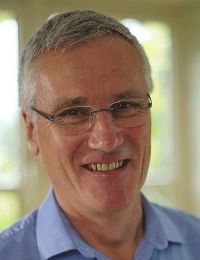
In this presentation, Dr. Hazelbaker presents the core principles of the practice of craniosacral therapy and how it garners results. She further discusses its use as an adjunct to or replacement for tongue-tie revision, especially as it pertains to the controversial posterior tie and labial tie.
After this presentation, participants will be able to:
IBLCE detailed content outline: I, III, V, VI, VII
Many issues can affect a baby's ability to feed effectively. The process of being born is one of the most powerful experiences that anyone can go through. There are many factors in this process such as emotional, physical and neurological imprinting that have profound effects on babies. The way we are welcomed into this world has a strong effect on our relationship to it and our relationship to nourishment. For example, some interventions (such as c section or ventouse) have both physical and emotional ramifications for a baby (for example effects on the jaw and the cranial base). Other pharmacological interventions might have both physical and neurological effects on baby’s ability to latch on. In this talk, John will go through some of the implications for breastfeeding on how we come into this world leading to a greater understanding of the challenges from the baby’s perspective.
IBLCE detailed content outline: I, IV, VI, VII
Karlton will address memory crying, eye contact, facial gazing and arousal states with babies. Memory crying is how the baby communicates implicit memories of their birth experience. Karlton will explain the difference between implicit and explicit memory and how implicit memories get stored in the body and triggered. Participants will learn about the process of Accurate Empathy and how this remedies “colic” and helps babies fall asleep easier, sleep longer, breastfeed better, and be overall more peaceful. During the presentation, Karlton will address arousal activation states in babies and how this knowledge is also important for partners or anyone who is unable to breastfeed. Participants will learn what they can do to help a baby’s development of self-regulation, and to help a baby establish and understand its own internal impulses and motivations.
IBLCE detailed content outline: I, V, VI, VII
Cultural preconceptions about calm babies being 'good' babies brings pressure on both parents and babies. It is based on values that diminish the expressive nature of babies and lacks an understanding of how we regulate stress levels. After the presentation participants will be able to
IBLCE detailed content outline: I, V, VII
Parents and professionals are often confused by how babies present: What makes some babies more difficult to soothe than others? A stressed baby is harder to settle and breastfeeding may be disrupted. Babies will often agitate or resist at the breast as well, further confusing and frustrating parents. This presentation will help participants understand the Sensitive Baby, and outline tools for assessment for practice and education.
Participants will be able to:
IBLCE detailed content outline: I, III, V, VI, VII
Understanding baby’s earliest relationship experiences from the baby’s point of view and how these experiences set in motion life patterns has been the intense study of the field of Prenatal and Perinatal Psychology (PPN) for over 40 years. Prenatal and Perinatal Psychology-oriented clinical experience with babies, children, and adults evolves and expands our lens of understanding early development, early relationships, and how to support optimal human potential and relationships from the beginning of life. In this presentation, Dr McCarty will distil key findings, principles, and understandings that portray baby’s expanded multidimensional nature and their implications for families during the breastfeeding period. She will share luminous baby wisdoms – gems she has learned from babies in her clinical work with babies and parents with breastfeeding issues. These wisdoms deepen and expand how we can understand and support babies during this all-important developmental experience. One specific developmental step of breastfeeding – that of completing breastfeeding – will be highlighted in her discussion. How can we best support the most optimal transition and successful completion for baby, mum (and fathers too)?
IBLCE detailed content outline: I, V, VI, VII

Alison K. Hazelbaker
Dr Hazelbaker has been in private practice for nearly 40 years. She has been cross trained in several modalities to best assist her clients. She is a licensed massage therapist, a craniosacral therapist, a pre and perinatal educator, a certified Rhythmic Movement practitioner, and an International Board Certified Lactation Consultant. She teaches the series of classes that comprise the Certified Independent Lactation Therapist Diploma program that features craniosacral therapy as the foundational skill.

Matthew Appleton
Matthew Appleton is a psychotherapist, craniosacral therapist and founder of Integrative Baby Therapy. He has more than 20 years experience of international teaching and workshop facilitation. His primary focus in on how our early prenatal, birth and early child hood experiences inform our sense of ourselves and the world we live in. He is the author of two books: A Free- Range Childhood. Self Regulation at Summerhill School and Transitions to Wholeness. Integrating Prenatal, Somatic and Transpersonal Psychology.

Kate White
Kate White is an award-winning prenatal and perinatal educator and an advanced bodyworker. She is trained in somatic therapies, prenatal and perinatal health, lactation, brain development, infant mental health, and has specialized in mother-baby dyad care using somatic prevention and trauma healing approaches for over 20 years. She is a mother of two children, holds a BA and MA in communication, a registered craniosacral therapist in the biodynamic craniosacral method and a Somatic Experiencing® practitioner. Her work combines somatic therapy, birth preparation, recovery from difficult birth, breastfeeding support, trauma prevention and resolution and brain development to help give families with babies and small children the best possible start. She currently runs a private practice and offers seminars and training as the Founder and Director for the Center for Prenatal and Perinatal Programs.

John Wilks
John Wilks is the author of six books including Choices in Pregnancy and Childbirth (2015), An Integrative Approach to Treating Babies and Children (2017), Understanding Craniosacral Therapy and several books on the Bowen Technique. He was a co-founder of the Breath of Life Conferences in London and was a speaker at the first British Fascia Symposium and lectures all over the world on manual approaches to working with mothers and babies. He runs two large internet based teaching programmes specialising in delivering high quality webinars and courses to health professionals

Karlton Terry
Karlton is one of the world’s leading baby therapists and instructors. His courses are now being taught across Europe, Australia and the US where he supervises and continues to influence some of the preeminent baby therapists of this generation. Now he wants to share the gifts of Accurate Empathy, Baby Body Language, Somato -magnetism, and the Birth Mask Reveal (BMR) with practitioners and parents around the world.

Wendy Anne McCarty
A visionary leader in prenatal and perinatal psychology (PPN), Wendy Anne is a PPN academic, trainer, author, theorist, and ground-breaking therapeutic practitioner with babies, children, and families. She is dedicated to supporting the actualisation of the true nature and wholeness of human potential and relationships from the beginning of life while restoring and repairing early trauma and unmet needs at any age. Dr McCarty’s unique approach synthesizes her pioneering PPN early development model, consciousness studies, energy-wholing techniques, intuitive skills, and 30+ years of therapeutic work directly with babies both in-person and distantly. She is the author of the book Welcoming Consciousness: Supporting Babies’ Wholeness from the Beginning of Life and 40+ other publications. She is also the recipient of the Thomas Verny Award for Excellence in PPN.